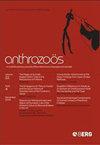“有一条丑陋的法律”:狩猎组织如何描绘非人类动物的道德含义
IF 2.3
2区 农林科学
Q2 SOCIOLOGY
引用次数: 0
摘要
我们调查了芬兰和英国的四个狩猎组织(芬兰野生动物机构、芬兰猎人协会、英国射击与保护协会和乡村联盟)如何在他们的网页上描述野生动物,以及这些描述的道德含义。这些狩猎组织如何定义动物,这又如何影响对这些动物的道德考虑?通过话语分析和哲学分析,我们发现这些描述主要集中在物理属性上,而忽略了动物的思想。因此,狩猎组织参与了非人类动物的精神化(低估或否认思想),这与机械形态(将动物描述为生物机器)相互联系。我们认为,描述中的精神化和机械形式化服务于战略目的,因为它们阻碍了认识动物经验和个性的可能性,并将动物伦理问题排除在外。此外,这些组织倾向于只从人类利益的角度来看待狩猎的伦理,而把动物的利益和内在价值放在一边。总而言之,狩猎组织描绘动物的方式很容易忽视有关杀害动物的伦理问题。本文章由计算机程序翻译,如有差异,请以英文原文为准。
“Has an Ugly Caw”: The Moral Implications of How Hunting Organizations Depict Nonhuman Animals
We examined how four hunting organizations in Finland and in the UK (The Finnish Wildlife Agency, Finnish Hunters’ Association, The British Association for Shooting and Conservation, and Countryside Alliance) describe wild animals on their web pages and what the moral implications of these descriptions are. How do these hunting organizations define animals, and how does this impact the moral regard given to these animals? Using discourse analysis together with philosophical analysis, our examination revealed that the descriptions focus mainly on physical attributes, leaving out the minds of animals. Therefore, hunting organizations take part in dementalization (underestimation or denial of minds) of nonhuman animals, which interlinks with mechanomorphism (the depiction of animals as biological machines). We argue that dementalization and mechanomorphism in the descriptions serve a strategic purpose, as they hinder the possibility of recognizing animal experiences and individuality and keep animal ethical questions out of view. Further, the organizations tend to approach the ethics of hunting through the perspective of human interests only, whilst the interests and inherent value of animals are sidelined. In sum, the way in which hunting organizations depict animals is prone to sidelining ethical issues concerning the killing of animals.
求助全文
通过发布文献求助,成功后即可免费获取论文全文。
去求助
来源期刊

Anthrozoos
农林科学-兽医学
CiteScore
3.40
自引率
18.80%
发文量
43
审稿时长
>36 weeks
期刊介绍:
A vital forum for academic dialogue on human-animal relations, Anthrozoös is a quarterly, peer-reviewed journal that has enjoyed a distinguished history as a pioneer in the field since its launch in 1987. The key premise of Anthrozoös is to address the characteristics and consequences of interactions and relationships between people and non-human animals across areas as varied as anthropology, ethology, medicine, psychology, veterinary medicine and zoology. Articles therefore cover the full range of human–animal relations, from their treatment in the arts and humanities, through to behavioral, biological, social and health sciences.
 求助内容:
求助内容: 应助结果提醒方式:
应助结果提醒方式:


